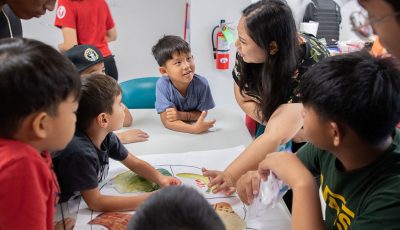VOICES: Katrina S. Punzalan

Katrina Punzalan, 19, is flanked by her mother, father, and siblings after graduating from Saipan Southern High School last year. She currently attends the University of Washington. (Contributed Photo)
Editor’s note: In Saipan Tribune’s latest weekly series, “Voices” shares the stories of those in the CW community and sheds light on the humanitarian crisis in the CNMI.
Katrina S. Punzalan walks on the large University of Washington campus with a heavy heart. It’s not her classes that worry her, though. Her parents are contract workers who’ve lived in the CNMI since the 1990s. Punzalan, a Saipan Southern High School alumna, was active in her school and around her island home where she was born.
Her mother, Riza, works as a general manager and her father, Danny, works for a security agency.
“They’ve worked here, lived here, and raised all three of me and my siblings here for over 20 years and still there are policies that don’t care about that and want to chase them out,” she told Saipan Tribune.
“The connotations that come with the CW cap are very complicated for them. It would not be easy resettling somewhere else after making a home out of a place, the uncertainty behind that definitely makes things very unsettling,” the 19-year-old added.
Punzalan, who is pursuing a double major in Law, Societies, & Justice and American Ethnic Studies, explained that she feels “unsafe” to some degree. She said that some of the most vocal people in the conversation have made families like hers feel unwelcome.
In her recent studies, Punzalan noted that she is more aware of the dynamics that affect the CNMI in regards to immigration and race.
“…we’re so racially diverse, but that diversity is actually what makes the connotations of this conflict so unique. It’s people of color being pitted against other people of color, I think. Racism just goes over people’s heads. If we were more set on calling people out when they say something ignorant or racist, I think we would have an environment that would not thrive as much on racism and xenophobia to the point that we have issues like the CW cap that reflect it. I do think it’s now more than ever that our community needs to prove its cohesiveness,” she added.
With a situation she described as “fickle,” Punzalan is unsure if she will return to the islands after completing her education like she initially planned.
Punzalan also worries about her family’s ability to continue funding her university education.
“Now even more pressure is placed on my family to save up because the threat of deportation is filled with so much uncertainty. It also got me thinking about my own future,” she said.
She told Saipan Tribune that her family is hoping for the best, but preparing for the worst. Punzalan expressed concern for the well being of her siblings, who speak Tagalog as a second language and consider Saipan their home as well.
“That scares me a bit because I like school a lot. I’m hoping to do a thesis on the subject of Asian migration to the CNMI for one of my majors before I graduate. I’d really like to accomplish that.”
In discussing her circumstances with peers in similar situations, Punzalan said that many youth are unsettled that the place they’ve called home for so long can “put their families in such a limbo.”
Punzalan said that she is overwhelmed by the community’s response. She added, “‘I’m so grateful to the members of the local community who have been supporting the plight of the CW, even at the cost of political and community opposition.”
Punzalan noted, however, that more can be done. “…History repeats itself if we don’t learn from it. Xenophobia is not the answer. I really do believe that the CWs on Saipan have done nothing but give to these islands, even as disenfranchised individuals,” she explained.
She said that she appreciates the action taken by the local administration, but is not satisfied. “If the primary politicians with the power to move this issue in the right direction were to do their jobs with that sort of relentless service to the community, I think more could be accomplished.”
Punzalan hopes that the islands’ immigration policies one day reflect that there is a place for the CW community and their families. She said, “We don’t have to chase for the economic surge of American cities at the price of choosing privilege and racism over love and community.”



























